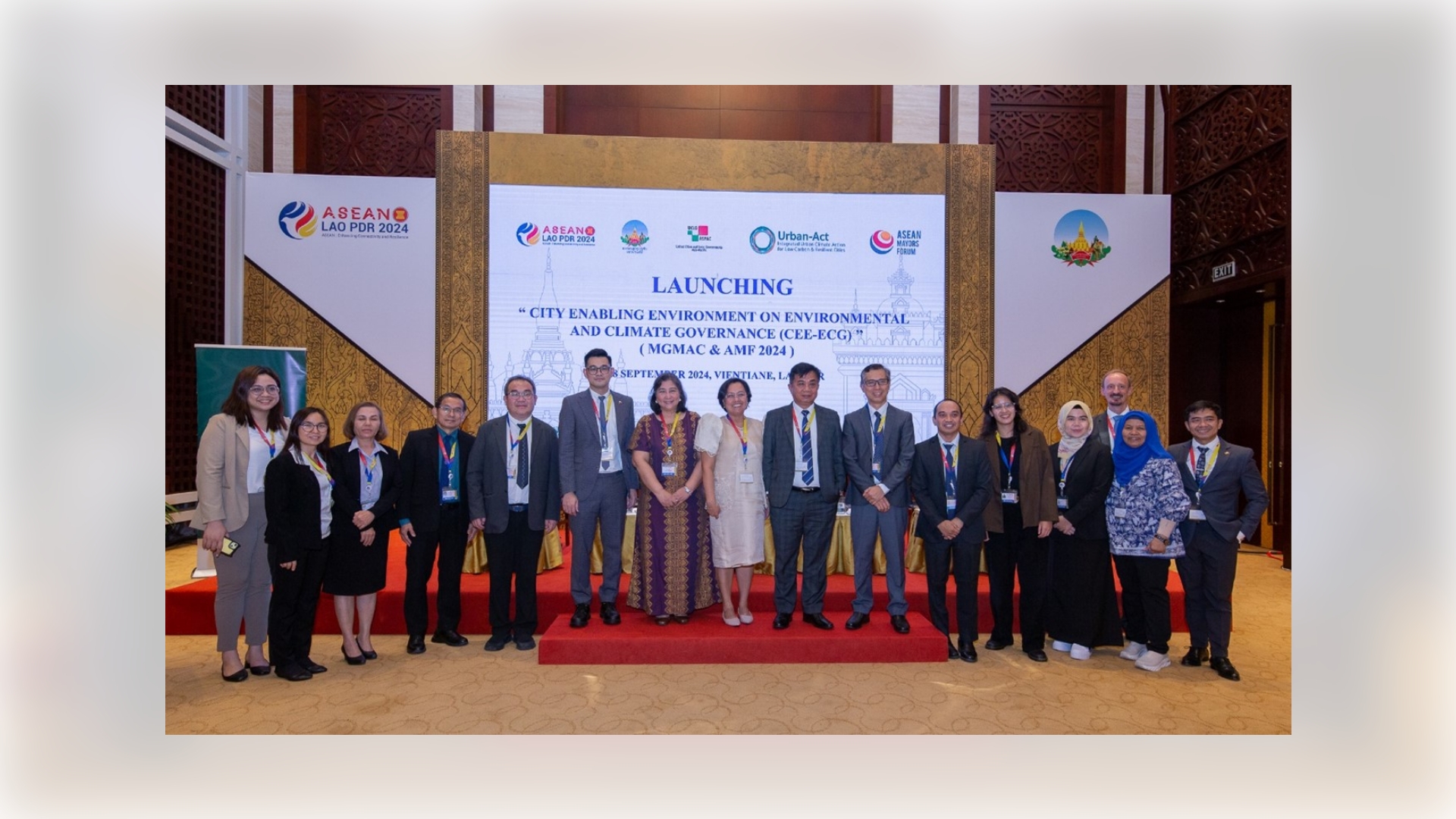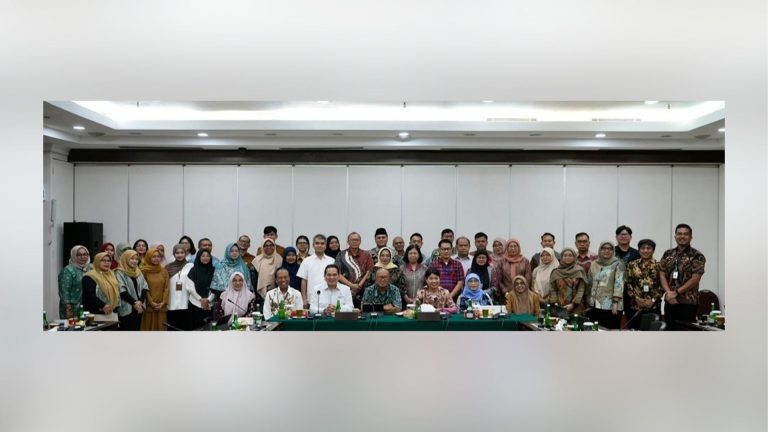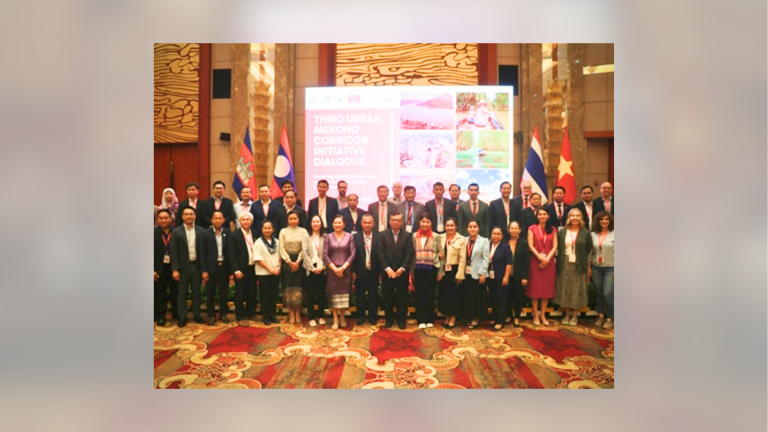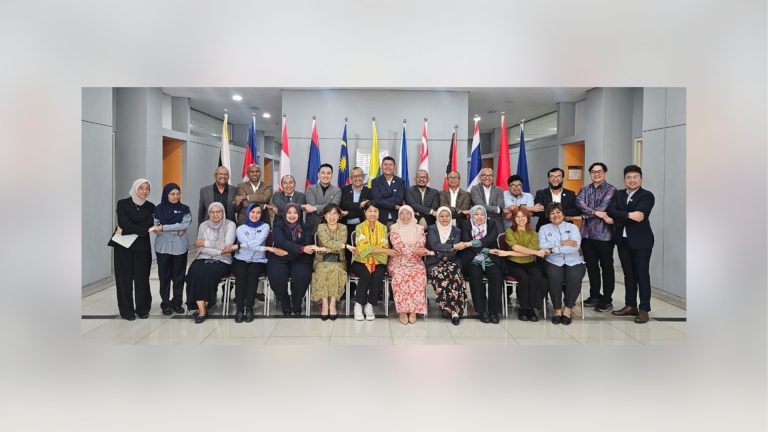September – October 2024 | UCLG ASPAC Urban-Act Project has also continuously engaged more partners and activities, and identified opportunities to build local climate resilience, such as the ASEAN Mayors Forum (AMF) 2024 in Vientiane and the 8th Committee on Environment and Development (CED) Meeting in Bangkok, as well as conducting facilitation of investment project workshop and learning exchange and city pairing to enhance the efforts.
Investment Project Workshop in Padang and Medan
October 24-25, 2024 | UCLG ASPAC together with GIZ Indonesia co-facilitated the Workshop on “Investment Project Identification for Municipal Solid Waste Management” organised by ESCAP. The workshop took place in the Urban-Act pilot cities of Padang (October 10-11, 2024) and Medan (October 24-25, 2024). Its primary goal was to identify potential investment projects for waste management and gather critical information to enhance project readiness for financing. This effort plays a vital role in preparing projects to secure financing from platforms such as the City Climate Gap Fund. The successful identification of projects during this workshop will lay the groundwork for developing pre-feasibility studies, enabling Padang and Medan to access additional financing opportunities.
This workshop is part of the Urban-Act project’s ongoing efforts to focus on Output 3, which entails identifying priority climate actions for the pilot cities. It also served as a follow-up to a series of regional training sessions held in Bangkok in June 2024, where both Medan and Padang selected municipal solid waste management as their primary area for intervention. The workshop was attended by approximately 67 representatives from various departments of Padang and Medan City Government (including delegates from the Development Planning Agency, Environmental Agency, and Public Works and Housing Agency); private sectors; universities; and waste communities. The workshop was attended by Mr. Omar Siddique, Urban-Act Project Coordinator from ESCAP, Ms. Fiferi Murni (GIZ), and Mr. Didi Aryadi, Assistant II for Economic and Development Affairs of Padang City, and Benny Iskandar, Head of Development Planning of Medan City.
As a result of the workshop, Padang identified an investment project aimed at improving municipal solid waste management through enhanced segregation and resource recovery. Meanwhile, Medan is focusing on strengthening community-based waste management infrastructure, which includes initiatives like TPS3R (Reuse, Reduce, and Recycle Waste Processing Sites), maggot centers, and the integration of recycling centers. The outcomes from these workshops will be presented during the Urban-Act training on climate finance for cities at the World Urban Forum (WUF12). Furthermore, the identification of investment projects will enable Padang and Medan to tap into future financing opportunities.
City Pairing and Learning Exchange on Waste Management: Padang City and Malang Regency
Following the workshop in Padang City, a back-to-back event was held to facilitate a City Pairing and Learning Exchange focused on waste management practices with Malang Regency. This city-pairing initiative serves as a valuable platform for cities facing similar challenges to share knowledge, and best practices, build capacities, and enhance resilience planning in waste management. During the exchange, Malang Regency highlighted its initiatives in the waste management sector, particularly its Integrated Resource Recovery Center (IRRC), established in 2019 by UCLG ASPAC and UNESCAP. The IRRC aims to manage waste more sustainably while recovering materials and energy through three key approaches: (i) waste sorting, (ii) composting, and (iii) waste-to-energy processes.
ASEAN Mayors Forum 2024
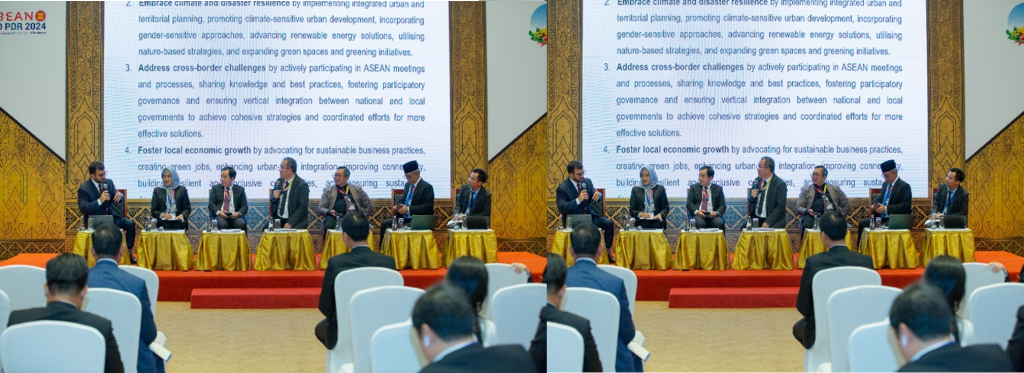
September 18, 2024 | The Urban-Act Project joined the AMF 2024 and co-organised a workshop on September 18, 2024, under the parallel session 5 on Climate Resilient. The AMF 2024 theme was “Enhancing Connectivity and Resilience for Sustainable Development of ASEAN Cities,” the event was organised by UCLG ASPAC and hosted by Vientiane Capital Administration, Lao PDR. UCLG ASPAC AMF is a platform for Urban-Act pilot cities to share knowledge and development experience in the region.
The parallel session 5 was participated by five cities and moderated by Mr. Omar Siddique, Head of Unit, Sustainable Urban Development, UNESCAP, the session started with highlight of the ambitious targets on transitioning away from fossil fuels, loss-and-damage-fund, the roadmap to mission 1.5 ℃ and multilevel climate action became a decision. Further, the Coalition for High Ambition Multi-Level Partnerships (CHAMP) initiative was also mentioned during the discussion seen as a unique added value between national and local governments to increase the urban content of Nationally Determined Contributions (NDC) by 2025.
All five cities shared good practices with the following key points:
- Padang: Urban adaptive spatial planning for climate change and DRR plan alignment, the construction of Green Open Space, limit the development of various activities and settlements in areas designated as disaster-prone zones, develop facilities and infrastructure that function to mitigate disaster impacts, and implementation of circular economy / waste management.
- Pakse City shared practice on urban flooding strategy by building the flood and landslide barrier along Mekong and Sedon riverside.
- Khon Kaen City shared the seven keys to unlock the challenge with innovative solutions particularly saving energy city and reducing greenhouse gas emissions by using solar panel and building more green spaces, project of urban drainage system for flooding management, and develop the Transit Oriented Development (TOD) system.
- Medan City presented the practice on building climate resilience for both mitigation and adaptation side. In the mitigation, it focuses on sustainable transport, clean energy, and energy efficiency, meanwhile in the adaptation are focused more on flood protection, infrastructure upgrade, disaster and business continuity. The presentation also highlighted experience in developing the carbon credit investment in sustainable landfill closure and community engagement for waste (supporting startups), utilising Public Private Partnership, the Corporate Social Responsibility management for environmental sector tree planting, and revitalisation of green open spaces.
- Pontianak City shared the flood mitigation strategy such as integration of the drainage system in the waterfront area.
The session key recommendations for the AMF 2024 Declaration were presented by Mr. Boonyalit Phanichrungruong, Deputy Mayor of Khon Kae City, Thailand as representative of Urban-Act Pilot City with following key recommendations:

- Demonstrating commitment to implement and to localise the NDC by ensuring sustained efforts and finding alternative investments in climate resilience. This calls for the active involvement of governments, private sectors, and communities, fostering collaborative efforts.
- Integrating Disaster Risk Reduction (DRR) and climate change adaptation (CCA) that incorporates socially inclusive and gender-sensitive approaches.
- Aligning the DRR-CCA plan from the planning process to the implementation and monitoring aspect that is in line with the ASEAN Agreement on Disaster Management and Emergency Response (AADMER) and ASEAN Community Vision 2045.
- Promoting better collaboration to allow local government to share resources and expertise by improving their collective response, establishing rapid response mechanism, and including disaster relief and early warning system to mitigate the impact of disaster.
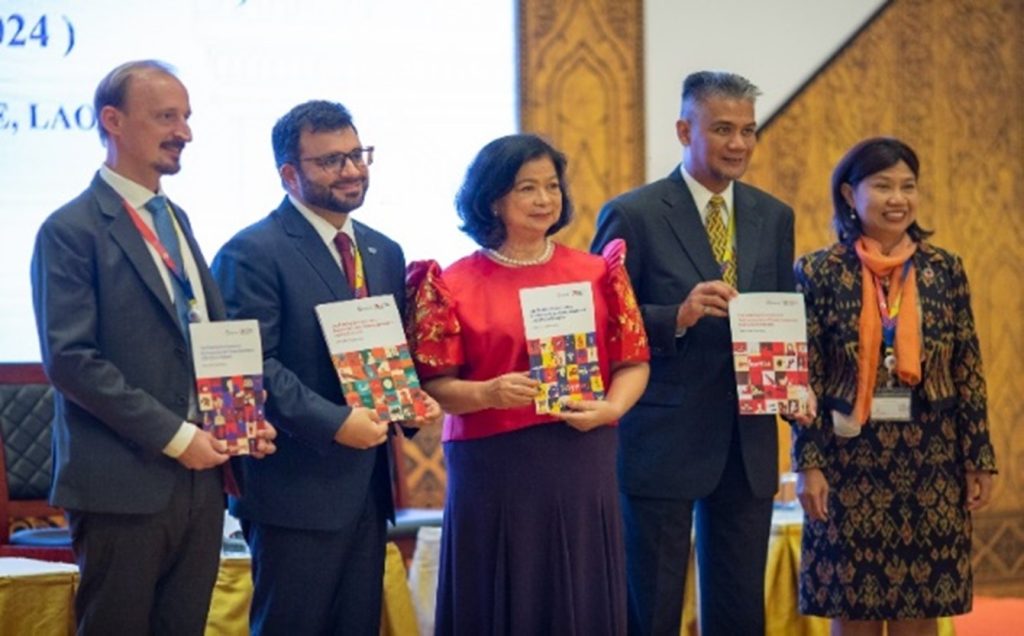
The City Enabling Environment on Environmental and Climate Governance (CEE-ECG) assessment report was officially launched in conjunction with the AMF 2024 on September 18, 2024, in Vientiane, Lao PDR. The launching started with the keynote remark delivered by Dr. Bernadia Irawati Tjandradewi, Secretary General of UCLG ASPAC. She emphasised the adoption of CEE Rating criteria 11 on environmental and climate governance to provide a baseline for Urban-Act pilot countries in providing essential insights into the legal, financial, and governance frameworks that are needed to enable cities to act the climate target challenges and opportunities cities face in building climate resilience. The CEE-ECG baseline report of five countries was distributed officially to four representatives as follows:
- Ambassador Elizabeth Buensuceso, Former Vice Minister and Eminent Person of the Philippines to the HLTF-ACV 2045
- Ambassador M.I. Derry Aman, Ambassador/Permanent Representative of the Republic of Indonesia to ASEAN
- Mr. Omar Siddique, Head of Unit, Sustainable Urban Development, UNESCAP
- Mr. Heinrich Gudenus, the Director of the Urban-Act Project, GIZ Thailand
The session continued with panel discussion that also shared the national perspective from the Philippines which the participation of Mr. Atty. Carlos M. Borja Jr, Chief of Legal Services Division of Climate Change Division and Mr. Jimmy Loro, Chief Advisor of South-South Collaboration on Climate Information Services (SSCIS) GIZ Philippines. Several key enablers and obstacles to effective environmental and climate governance in urban settings, included:
- Legal and Regulatory Frameworks: Many cities have made significant strides in adopting national climate policies. However, there is a clear need for stronger legal frameworks that empower local governments to act independently and decisively. Local climate action plans must be embedded in national policies, and cities need to be given the autonomy to implement these plans without unnecessary bureaucratic hurdles.
- Governance and Institutional Capacity: While national governments play a critical role in setting the agenda, it is the local governments that must lead on the ground. The CE-EECG underscores the need for more robust institutional support for local governments. This includes improving governance systems, streamlining inter-agency coordination, and enhancing capacity-building efforts to ensure that local authorities have the expertise and tools to implement effective climate actions.
- Financing and Resource Mobilisation: Climate action cannot happen without adequate financing. The CEE-ECG reveals that many cities still struggle to access the funding they need for climate resilience projects. We must work collectively to ensure that cities can tap into a wider range of financial mechanisms, from municipal bonds to public-private partnerships, and leverage global climate funds more effectively.
- Public Participation and Engagement: Successful climate governance requires the active participation of citizens. The CEE-ECG highlights how public engagement especially involving marginalised communities, women, and youth can strengthen climate policies and make them more inclusive. Empowering people to participate in climate decision-making processes ensures that solutions are not only effective but also equitable.








